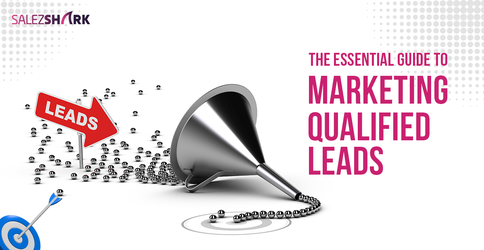In the rapidly evolving and fiercely competitive realm of modern business, the process of lead generation represents merely one aspect of the challenge. To truly prosper and maintain sustainable growth, organizations must direct their efforts towards drawing in not just any leads, but the right ones. This is precisely where Marketing Qualified Leads (MQLs) come into the spotlight. In this extensive guide, we shall delve into the importance of MQLs, the art of recognizing and nurturing them, and their pivotal role within the contemporary marketing and sales landscape.
What is Marketing Qualified Leads (MQLs)
Marketing Qualified Leads (MQLs) represent potential customers who have displayed authentic interest in a product or service through their online engagements and interactions. These leads are not haphazard individuals; they exhibit specific behaviors and attributes that enhance their likelihood of converting into paying customers. It’s important to note that MQLs should not be confused with raw leads, as they have already undergone a degree of prequalification through marketing initiatives.
MQL Characteristics
Marketing Qualified Leads (MQLs) exhibit several key traits. Firstly, they actively engage with a company’s content, whether it be through reading blog posts, interacting on social media, or participating in email campaigns, often indicating their interest by downloading eBooks, subscribing to newsletters, or engaging on various social media platforms. Additionally, MQLs typically align with the company’s ideal customer profile, sharing demographics like industry, job title, company size, and location that closely match the intended target audience. Lastly, MQLs showcase behavioral indicators of interest, frequently visiting the company’s website, clicking on specific product pages, and actively participating in webinars and other interactive content, all contributing to their qualification as potential customers.
Marketing’s role in identifying MQL
Marketing teams assume a pivotal role in the identification and cultivation of Marketing Qualified Leads (MQLs). This multifaceted process encompasses lead scoring, which assigns numerical values to leads based on their exhibited behaviors and attributes, thereby gauging their readiness to progress through the sales funnel. Additionally, marketing leverages content personalization to craft materials that deeply resonate with MQLs, directly addressing their concerns and preferences to bolster engagement. Furthermore, marketing automation tools are employed to streamline the tracking and nurturing of leads, enhancing efficiency and scalability in this critical endeavor.
Significance of MQLs
The Significance of MQLs extends beyond mere industry jargon, as they play a crucial role in bridging the gap between marketing and sales endeavors, offering a range of notable advantages. Firstly, they enhance efficiency by preventing sales teams from being overwhelmed by unqualified leads, enabling a concentrated focus on prospects with a higher likelihood of conversion, thus yielding superior efficiency and return on investment. Secondly, the pre-qualified nature of MQLs results in an improved customer experience, given that these leads have already expressed interest in the company’s offerings, making them more receptive to marketing and sales communications. Furthermore, MQLs exhibit a higher potential for conversion into paying customers in comparison to raw leads, leading to heightened sales conversion rates and accelerated revenue growth. Lastly, MQLs contribute to data-driven decision-making by offering valuable insights into the most effective strategies and channels for driving engagement and conversions, informing future marketing initiatives.
What is Marketing Qualified Opportunity (MQO)?
A Marketing Qualified Opportunity (MQO) is a critical stage in the sales and marketing pipeline, where a lead has transitioned from being a mere prospect to a genuine opportunity for conversion. This signifies that the lead has not only shown interest in a product or service but has also been nurtured and evaluated to a point where they meet specific criteria set by the marketing team. These criteria often include factors like the lead’s engagement level, their fit with the company’s target audience, and their readiness to make a purchase.
The distinction between a Marketing Qualified Lead (MQL) and a MQO is that an MQO is not just a warm lead; it’s a lead that is considered sales-ready, indicating that it’s time for the sales team to step in and work towards closing the deal. Identifying and properly managing MQOs is crucial for businesses, as it streamlines the sales process, maximizes conversion rates, and helps allocate resources effectively to focus on leads that are most likely to become paying customers. In essence, MQOs are the bridge that connects marketing efforts with sales efforts, ensuring a smoother journey from initial interest to successful conversion.
Nurturing MQLs
Nurturing Marketing Qualified Leads (MQLs demands a strategic and systematic approach, and here are some effective tactics to ensure their smooth progression through the sales funnel. Firstly, in the realm of Content Marketing, offering educational content tailored to address their pain points and enlighten them about your products or services is crucial. Implementing email drip campaigns, which consist of automated sequences delivering pertinent content at the right stages of the MQL’s buyer’s journey, can be highly effective. Hosting webinars and workshops provides an opportunity for MQLs to engage with your brand, ask questions, and gain in-depth knowledge about your offerings.
Secondly, Personalization is paramount. Segmenting MQLs based on their interests, behaviors, or demographics and customizing your communication for each segment can significantly boost engagement. Utilizing dynamic content on your website and in emails further personalizes the experience, displaying content and offers that align with individual interests. Thirdly, Lead Scoring and Qualification is vital, involving continuous tracking of online behavior to identify those MQLs exhibiting signs of readiness to purchase. Effective collaboration between your sales and marketing teams ensures the seamless transition of MQLs to the sales team when the time is right.
Additionally, leveraging Remarketing and Retargeting strategies keeps your brand visible as MQLs navigate the web, utilizing display ads and social media retargeting to reinforce your message. Social Proof, such as customer testimonials, case studies, and reviews, is instrumental in building trust with MQLs and motivating conversions. Lastly, Data-Driven Decision Making is integral, as MQLs offer valuable insights into the most effective strategies and channels for driving engagement and conversions, shaping future marketing efforts accordingly.
Measuring MQL Success
To assess the efficacy of your MQL strategy, it’s essential to establish and consistently measure key performance indicators (KPIs). These KPIs may encompass a range of metrics, including conversion rates, which gauge the percentage of MQLs progressing to the next sales funnel stage; revenue generated from MQLs and their impact on the bottom line; an analysis of the long-term customer lifetime value for MQLs who transition to customers; the cost per MQL, calculating the expense of acquiring an MQL through marketing efforts; and monitoring lead velocity, which keeps track of the pace at which MQLs advance through the funnel and its influence on revenue growth.
MQL Lead Example
Let’s take an example of a Marketing Qualified Lead (MQL) to illustrate how they work. Meet Sarah, a marketing professional searching for a comprehensive project management software solution for her team. She stumbles upon a blog post on our company website about “Five Ways to Acquire Cost-Free B2B Leads for Your Small Business,” which provides valuable insights into acquiring B2B leads for your business.
Intrigued, Sarah not only reads the blog but also downloads a free e-book offered as a content upgrade, which delves deeper into lead management strategies. This indicates her genuine interest in our content and the specific area of lead generation & management. She then subscribes to our newsletter to stay updated on similar topics, and later, she interacts with our chat support to ask specific questions about our software’s capabilities. At this point, Sarah has become an MQL because she has actively engaged with our content and shown a keen interest in our product. Our marketing and sales teams can now work together to nurture Sarah and guide her toward becoming a valued customer. This real-life scenario underscores the practicality and effectiveness of MQLs in the world of marketing.
Challenges and Solutions
While Marketing Qualified Leads (MQLs) can significantly impact businesses, several challenges surround their identification and nurturing. Common obstacles include the delicate balance between lead quantity and quality (Solution: Regularly refine lead scoring criteria), the issue of data accuracy (Solution: Invest in data cleansing and validation tools), insufficient alignment between marketing and sales teams (Solution: Implement a service level agreement or SLA), and varying nurturing lengths for MQLs (Solution: Create tailored content and engagement strategies for leads at different stages of their journey). Overcoming these challenges is essential for harnessing the full potential of MQLs in a business context.
Conclusion
Marketing Qualified Leads are the lifeblood of modern businesses. They bridge the gap between marketing and sales, allowing companies to focus their efforts on leads most likely to convert. By implementing a strategic approach to identifying, nurturing, and measuring MQLs, businesses can improve efficiency, enhance customer experiences, boost conversions, and ultimately drive sustainable growth in today’s competitive marketplace. In a world where the customer’s journey is complex and varied, MQLs are the compass guiding companies toward success.

